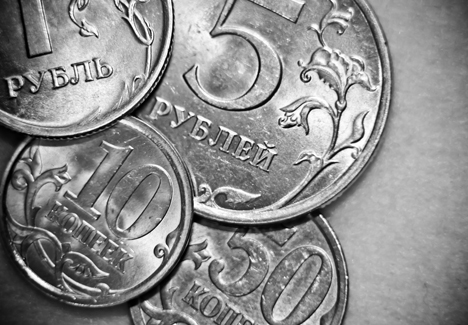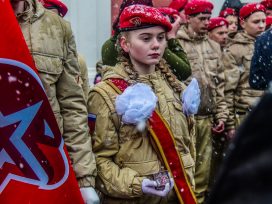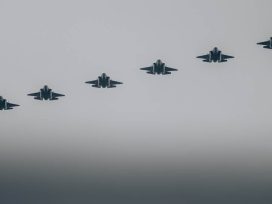Europe should prepare itself for long-term cooperation with the energy-rich kleptocracy that has developed on its eastern borders. Because, given that the personal enrichment of politicians is part of the very foundation of the regime, Russia’s ruling political elite is not about to change any time soon.
The future of Russia features prominently in European discourse these days. Most analysts focus on the rise of corruption, political ineffectiveness and street protests; others point to the flight of capital and gloomy economic prospects. While there are grounds for such speculation, I want to draw some attention to the inner workings of the contemporary Russian state. Moreover, I want to discuss the means by which the state may secure its survival for a comparatively long period of time.
My analysis consists of two main arguments. Firstly, the current system in Russia is based not on corruption in the traditional sense, but on a complete merger of public service and private business interests; members of the political elite are focused not on the welfare of the nation but on their respective personal fortunes. Russia has in a sense been transformed into a “Russia, Inc.” in which the commercial interests of the political class dominate the needs of the population. Secondly, under such circumstances there is no hope whatsoever that the situation might be changed from above, since the “vertical of power” is strongly united by its business goals and will consolidate whenever it feels itself threatened. Consequently, I do not envisage any possibility of a conflict inside Russia’s ruling political elite in the foreseeable future.
Putin’s regime draws great strength from the immense wealth it commands. Russia’s federal revenues for 2012 exceeded 405 billion dollars, allowing the elite to allocate 20 billion to preparations for an APEC summit in Vladivostok; meanwhile, federal revenues in 1999 totalled less than 22 billion dollars. Similarly, Gazprom’s revenue has multiplied from 11 billion to 158 billion in the same period. This influx of cash affords Putin numerous opportunities: he is able to address the problems of the low-income population, to launch huge infrastructure projects and, most importantly, to look the other way as bureaucrats misuse vast sums of public money. This latter phenomenon serves to consolidate a system in which the personal enrichment of politicians is not merely sporadic but systemic; it is part of the very foundation of the regime, as well as its best guarantee against the “revolt of the elites”.
A culture of bureaucratic corruption
To draw analogies between corruption in the Western sense and corruption as practiced in modern Russia is to greatly underestimate the latter. Bureaucrats in modern Russia have a variety of legal avenues of siphoning off state funds – most commonly, a politician’s associates and relatives will organize various businesses which, through formal procedures, are granted public contracts; these contracts are then realized at greatly inflated prices. For example, while the A20 autobahn in northern Germany, finalized in 2005, cost less than 5.4 million euros per kilometer, the plan to construct a 520-km long, six-lane highway around Moscow’s outskirts is valued at 469 billion rubles, or 22.5 million euro per kilometer; such disparities fail to provoke surprise among Russians.
The so-called “siloviki” are engaged in a different enterprise: they open criminal investigations against the owners of successful businesses, charge them with tax irregularities and then force them to sell off their assets at cut-rate prices. Only nine per cent of such lawsuits are brought to trial, as opposed to around 94 per cent of first-degree murder cases. The vast majority of these lawsuits, then, are settled by other means – presumably in exchange for some form of bribe.

Photo: S. Bunkov. Source: Flickr
In the meantime, deputies often manipulate laws so as to benefit certain business interests – the so-called “tobacco lobby” spent more than 30 million dollars in order to postpone new legislation which would ban smoking in public places and tighten the rules of cigarette advertising, according to sources familiar with the issue. Once again, it is important to note that most of these activities fall within Russia’s current legal framework. The public service in Russia has already become a kind of very profitable business; would-be bureaucrats are motivated primarily by their drive to convert the privileges of political office into huge material benefits for themselves.
It is obvious that this culture of bureaucratic corruption could never have spread without the consent of the powers that be. Since Putin took power in 2000, not a single minister has been sentenced for any criminal wrongdoing, nor has any regional governor; the political elite is therefore placed largely above the law. The government sporadically issues warnings when it considers a particular transgression intolerable; such was recently the case with the Defence Ministry, where relatives and friends of the Minister, Anatoliy Serdyukov, appropriated hundreds of millions of dollars from selling off state assets. Even in so egregious a case, however, it is all but certain that Serdyukov will never be charged.
It is also crucial to assess the prospect of pressure from below. My view is that such pressure will not be particularly strong in the coming years. From December 2011 onward, no street rallies larger than 100,000 people were held in Russia, unlike the late 1980s, when million-strong crowds were a common occurrence in Moscow. In provincial cities the opposition movement is barely visible, and I believe it will exhaust itself in the coming year.
Why, then, does Putin’s government remain largely unchallenged? First of all one should acknowledge that present-day Russia is, in general, a relatively free country. Unlike in the Soviet era, Russians can now acquire property and conduct business, they have unlimited access to information and the Internet, all taboos have been lifted in personal life, and citizens can freely leave the country and return. The latter is of crucial importance, since more than one million Russians left the country in the past eight years, and more than four million Russians now possess cartes de séjour in EU countries alone, allowing them to stay abroad for long durations. This represents up to one third of those Russians who could properly be considered middle class in the European sense. Thus, many affluent citizens are ready to leave if Russia’s authoritarian features were to metastasize, and are consequently less anxious about the fragility of the country’s political freedoms. I suppose that the opposition forces would have much better chances of success were it not for this wave of middle-class emigration.
A free society under authoritarian management
This freedom doesn’t mean that Russia is – or will soon become – a liberal democracy, because it is mostly limited to “freedom from” rather than “freedom to” – citizens might be free from the necessity to get permission for leaving the country, but the liberties necessary for true political involvement remain rather limited. On the contrary, this system of corrupt governance produces a situation in which it becomes quite simple to resolve many of the problems an ordinary citizen or businessman may face, and to resolve them “on an individualized basis.” The strength of Putin’s model of rule is based on a complete devaluation of any collective action: while being able to resolve all one’s problems with bribes, one can expect to face the full force of the state apparatus if one decides to organize any kind of protest against rules and norms of the system, or even to openly challenge these rules. This peculiar mix of personal freedom and the option to resolve many problems in an “unofficial” manner results in the general feeling that life in contemporary Russia is, if not easy, at least quite comfortable for those who confine themselves to personal materialistic goals – and the vast majority of Russians may well fall into this category. Those who are completely dissatisfied are free to leave, after all – and in this case they would be even better off, because almost everywhere in Europe they would experience a lower cost of living and far more affordable housing prices than in any Russian city with a population of one million or more.
Overall, when looking at present-day Russia, one might accurately describe it as a free society under authoritarian management, with relatively few signs of discontent. Putin has brilliantly combined the seductive power of material wealth with the fruits of nearly absolute personal freedom, and he masterfully uses the might of the state to “correct” small irregularities arising from the liberal aspirations of certain segments of society. Taking all this into account, I do not expect serious problems for the regime to emerge before the new electoral cycle begins in 2016. One uncertainty it faces is the presumed vulnerability of oil and gas prices, given that 54 per cent of Russia’s budget revenues originate from the energy sector. However, I do not expect that oil prices will decline dramatically in coming years, since the global economy has already adapted to the current price point over the last decade. Meanwhile, Russia has already accumulated sufficient financial reserves to allow the state to cover any possible budget deficit for up to three years, even in the unlikely event that oil prices dip below 60 dollars per barrel. The only significant threat to the Russian system stems not from any internal conflict but from the personal thirst for power that motivates Putin himself. If he were tactful enough to have orchestrated a smooth transfer of power in 2008, as Chinese leaders do every ten years, this system would be capable of persisting for decades. But in returning to the presidency in May 2012, Putin placed his personal wishes above the needs of the political system he has built.
To wrap it all up, I would argue that Europe should prepare itself for long-term cooperation with the peculiar form of energy-rich kleptocracy that has developed on its eastern borders. Those who grow weary of Putin’s personality and his leadership style may try to vote for someone else in 2018; until then, it remains unlikely that anything sudden will alter Russia’s political landscape.
Published 28 June 2013
Original in English
First published by Eurozine (English version)
Contributed by Transit © Vladislav Inozemtsev / IWM / Eurozine
PDF/PRINTPublished in
In collaboration with
In focal points
Newsletter
Subscribe to know what’s worth thinking about.
Related Articles

Intellectual violence
The militarization of education in Russia
Education has become another battleground in the Kremlin’s campaign to militarize the Russian public consciousness. Youth organizations, book bans, changes to school curricula – all amount to a ‘special anthropological operation’.

Russian drones entering Polish airspace, militarily seen as intensified provocation rather than open warfare, have nevertheless provoked costly responses – both from NATO’s air defence systems and civilian reactions to disinformation. A war correspondent’s view of what can be done technologically – for greater military efficiency and improved civil defence.






